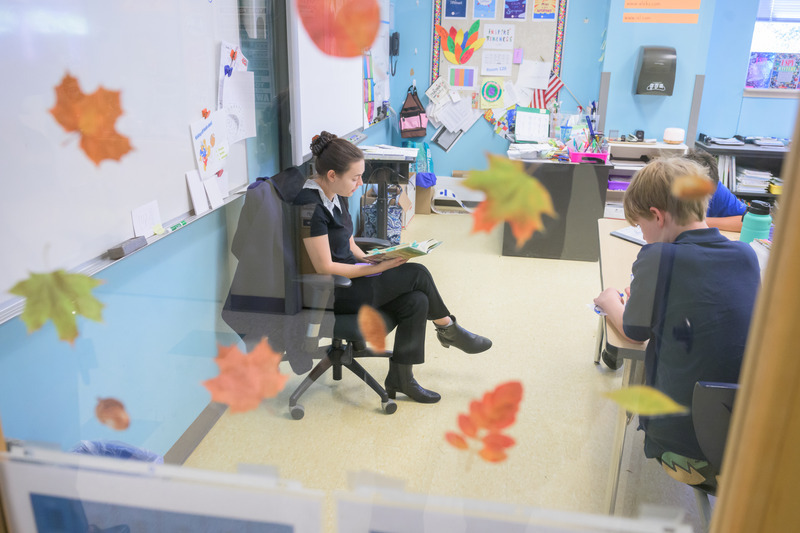Back-To-School Jitters

Experts from the College of Education and Human Development share research and guidance for supporting children as they reach new K-12 milestones
The back-to-school season is often marked by a flurry of nerves and excitement as children and parents return to their school communities after summer break. These feelings may be even more acute for children who will start the year as a brand-new kindergartener, middle schooler or high school student.
University of Delaware’s College of Education and Human Development (CEHD) is here to help. With expertise in child and adolescent development, faculty in CEHD’s Department of Human Development and Family Sciences (HDFS) and School of Education (SOE) share research and guidance for supporting children during their transitions to elementary, middle school or high school.
Elementary school
By the time their child reaches the age of 4 or 5, most parents and caregivers have heard about “kindergarten readiness” from early education teachers, pediatricians or family members. While this term includes a wide range of developmental skills, kindergarten readiness has become synonymous with academic readiness as kindergartens across the U.S. increasingly prioritize early math and literacy skills.
“For the transition from preschool to kindergarten, I think it’s less of a developmental change in the child than a change in what schools and teachers expect, since preschools are more play-based,” said Jason Hustedt, professor and chair of HDFS.
As Hustedt’s research in parent expectations and teacher expectations has shown, fostering those early math and literacy skills through play-based home activities that include reading and counting are important for later academic success. But his research has also found that kindergarten teachers still believe that self-help and social-emotional skills are more important than academic skills in beginning kindergarteners.
HDFS Assistant Professors Jessica Slade and Rosalyn Washington agree that attending to a child’s social and emotional needs are very important, as well as reserving time for free play and exploration.
“At the core of this transition is how the child feels psychologically, especially since many children will be the youngest members of a very big school community,” said Slade, program coordinator of CEHD’s associate program in early childhood education (ECE). “Creating a ‘coming home’ routine can be very valuable. Parents can set aside time for talking about how their child feels about school, helping them talk through anxiety, frustrations, hurts and other things that may come up.”
“While kindergarten has become a very academic space, parents can support children by making it clear that school is a safe space where children learn and grow,” said Washington, program coordinator for CEHD’s bachelor’s program in ECE and a former pre-k and kindergarten teacher. “At home, they can also be sure to carve out time and space for children to rest, enjoy time with friends, play, run, jump, make noise and enjoy reading with family members, just for pleasure.”
Middle school
For caregivers of children entering middle school, social and emotional skills may also be top of mind. Middle school marks a sometimes tumultuous time of rapid physical, social and emotional growth, accompanied by changing peer relationships in-person and online.
“During the middle school years, young teens spend more time with their friends and begin to navigate these relationships independently, rather than relying on their parents to arrange their social calendars and friendships,” said HDFS Professor Sara Goldstein, who studies adolescent development and social adjustment. “Aggressive behavior and bullying also peak during the middle school years, and young teens nowadays are confronted with multiple forms of bullying including physical, relational (like gossiping and exclusion) and cyber bullying.”
Goldstein and her colleague Mellissa Gordon, associate professor in HDFS, both stress the importance of supportive parent-adolescent relationships, especially when it comes to navigating social media. Gordon’s research has shown that early adolescents who experienced high-quality communication with their mothers continued to succeed academically, despite their frequent social media use.

“Healthy parent-adolescent relationships encourage support, openness and a sense of trust that will likely translate into good habits and practices when teens are navigating social media,” said Gordon, who studies adolescent and young adult development. “Supportive parenting strategies, like rules regarding the frequency of using digital media, can also minimize negative consequences associated with social media and cyberbullying.”
High school
As teens enter high school, managing healthy relationships with both their peers and their family members continues to be important. As SOE Assistant Professor Brittany Zakszeski notes, supporting a teen’s ability to cope with stress, increased academic demands and social pressure is also critical.
“School psychologists commonly support high schoolers in managing healthy relationships and coping with stress and social pressure. These areas are highly related!” said Zakszeski, who specializes in school psychology. “The transition to high school often means navigating larger peer groups, gaining greater independence from teachers and family members and responding to increased academic and social demands. Many school psychologists support high school students with developing strong communication, conflict resolution, executive function and coping skills.”

At home, parents and caregivers can support their teens by maintaining open lines of communication, practicing conflict resolution and by modeling healthy boundaries with peers and technology. Parents can also help their teens develop specific skills that help them respond to a heavy academic workload, like time management and organization.
“Some teens might respond well to being directly asked about their friends, romantic partners and peer dynamics,” Zakszeski said. “Others might respond better to engaging in shared activities and initiating these conversations themselves. And parents concerned about their teen’s stress management — whether it’s social or academic — can always contact their high school to learn more about additional supports available in the school or community.”
To learn more about CEHD research in child and adolescent development or school psychology, visit its research webpage.
Photos by Kathy F. Atkinson.



